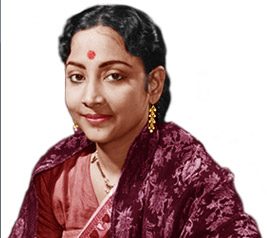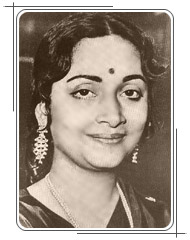Five decades ago, the renowned Marathi poet Vasant Bapat wrote a brace of songs - one an angry, anguished lament by Seeta when
she is banished to the forest by the lord Ram, the other a soft, romantic 'bhavgeet'. He got the well-known Marathi 'bhavgeet'
singer and composer G N Joshi to tune them. Who did this duo of Marathi artistes choose to sing these songs? My guesses (and,
I am sure, those of most people familiar with Marathi light music of the 1950s and 1960s) would include names like Manik Varma,
Malti Pande, Asha Bhosle, Suman Kalyanpur...the list would not be very long, but all the names on it would have Marathi either
as their mother tongue or, at the least, as the language of a vast body of their work.
|




